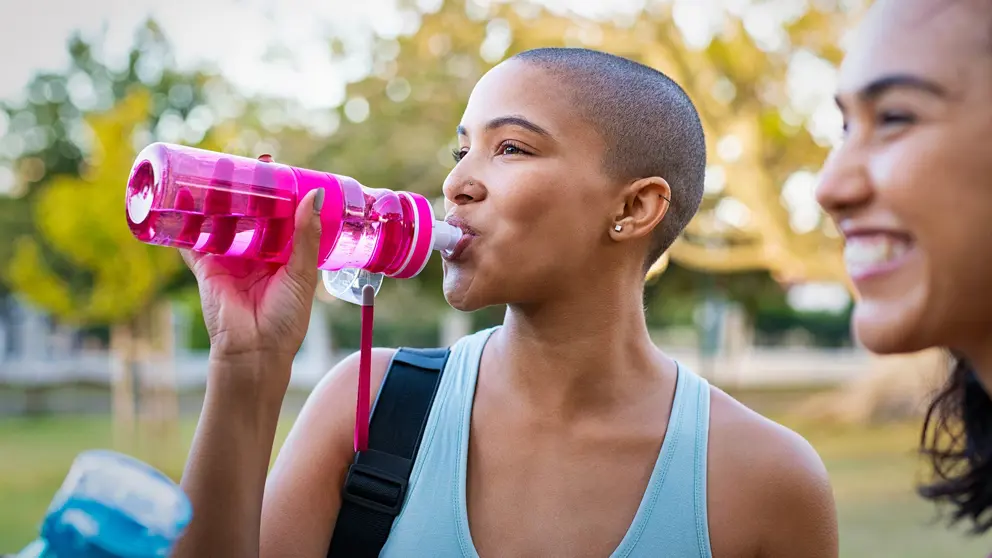There’s a dizzying array of beverages available in supermarkets, convenience stores and coffee shops, and you may wonder which are the best options. The easiest answer? Water. It hydrates the body but contains no calories or sugar. Choose it most often instead of sugary sweetened beverages.
While many beverage labels use fancy — and misleading — marketing terms to convey health and wellness, most drinks are little more than sugar-water. Sugary drinks are the number one source of added sugar in the Canadian diet, and too much added sugar is not good for heart health.
Studies show that drinking sugary drinks twice daily increases the risk of developing heart disease, stroke and type 2 diabetes, and raises the risk of dying from cardiovascular disease by more than 30%
So, choose water most often. Then consider this information to help you choose other beverages wisely:
Sugary drinks: Pop, iced tea, lemonade, vitamin water, sport or energy drinks, fruity beverages and many other commercial beverages contain added sugars. On average, they contain about 10 teaspoons of sugar per can (355 mL). Heart & Stroke recommends that your daily intake of added or free sugars not exceed about 48 grams (roughly 12 teaspoons). These drinks are fine as an occasional treat, but should not replace water as the beverage you sip all day.
Fruit juice: Just like pop, juice is a sugary drink with about 10 teaspoons of sugar per 355 mL juice. Drinking excessive amounts of pop or juice means you’ll likely consume too much sugar. But a little juice may be okay: some studies show that drinking about ½ cup (125 mL) per day has some heart health benefits, likely from the vitamins and antioxidants. Heart & Stroke still says “don’t drink your calories” and recommends whole fruit instead of juice. Learn more about juice.
Vegetable juice: Most commercial brands of tomato juice are very high in sodium, so aren’t the healthiest option. Fresh-pressed vegetable juice without salt or sugar is a healthier choice. Choose a low-sugar (less than 1 teaspoon) concoction like kale-celery or ginger-cucumber-lemon, which are filled with vitamins and minerals. The main drawback? These fresh-pressed elixirs come with a hefty price tag.
Coffee and tea: Coffee and tea (green or black) are 99% water, so they are good choices. While they contain caffeine, these beverages won’t cause dehydration when you consume moderate amounts: no more than 400 mg of caffeine daily (that’s about three 250 ml cups of brewed coffee or eight cups of strong black tea). Many people enjoy adding cream and sugar to coffee and tea, which is fine. Adding one teaspoon of sugar to tea is a better choice than a can of iced tea with 10 teaspoons of added sugars.
Smoothies: The health halo glows brightly over these thick concoctions, but is it warranted? It really depends what you blend. Some people add lots of fruit and juice, and the resulting smoothie may have 20-30 teaspoons of sugar – that’s more than a slice of cake! If it tastes like a milkshake, it probably should be considered a treat instead of a nutritious snack. Of course, healthy smoothies are possible when they are lower in sugar and rich in protein (but those don’t taste like milkshakes!).
Calcium-rich drinks: Once upon a time, this category was reserved for cow’s milk. These days, there are many plant-based beverages too – made with soy, rice, almonds, cashews, oats or pea protein. Choose cow’s milk, or read Nutrition Facts tables and choose a milk alternative that is fortified with calcium and vitamin D, has no (or minimal) added sugar, and contains about 8 grams of protein. Cow’s milk, soy and chickpea-based beverages milk are good options.
Artificially sweetened drinks: There’s much debate on this topic. Soda and other drinks made with artificial sweeteners are free from sugar and calories, so some say they are a better choice than sugary drinks. But research suggests that artificial sweeteners may harm the good bacteria in your digestive system. They may also trick your hormones into thinking there’s sugar in your system due to the sweet taste, which can result in problems with insulin and blood sugar levels. Artificial sweeteners are highly processed ingredients, so they aren’t adding any nutrition to your diet.
To recap, your best choices are hydrating beverages that contain minimal calories, sugar or salt. Reach for water, coffee or tea most often. And keep a water bottle handy – the visual cue reminds you to keep sipping. If plain water seems bland, jazz it up with a squeeze of citrus, some crushed berries, cucumber slices, a sprig of mint or a cinnamon stick.
Related information
- Learn the truth about juice
- Learn more about healthy eating to reduce your risk of heart disease and stroke.

